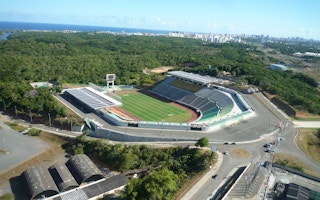With the United States turning increasingly inwards, Europe beset by economic and political challenges, and many developing countries facing internal and external threats, the BRICS emerging economies–Brazil, Russia, India, China, South Africa–have become a global grouping with one of the most outward-looking development and environment agendas.
In an increasingly unpredictable world, this partnership is pushing other countries and its own members towards support for open trade and the implementation of the Sustainable Development Goals (SDGs) and the Paris Climate Agreement.
But as the BRICS rise in wealth and power, and as they approach 10 years of partnership, they have an opportunity to go further.
This year’s summit (to be held in Xiamen, China, on September 3-5) is an opportunity for the bloc to demonstrate its leadership towards achieving a fairer, more sustainable world and to commit to fairness through both increased support for the Least Developed Countries (LDCs) and investment in sustainable infrastructure led by renewables.
The emerging economies of the BRICS include nearly half of the world’s population and control almost a quarter of global GDP. Since the group first met over a decade ago, their economic output has doubled. The result is that this partnership has turned into a political and economic feature of the post-superpower world that is here to stay.
Until a year ago, many of the BRICS declarations at its annual summit of leaders could be written off as empty platitudes with few mechanisms for follow up that would give them the teeth necessary to be effective.
But with the rise of Donald Trump and the decline of US influence, the BRICS have an opportunity to fill the growing political vacuum. And with global governance currently so weak, its focus on international issues is now one of its main strengths. It gets the weight of the largest and most powerful emerging economies behind a global agenda of multilateralism on trade, development and the environment.
Their most concrete success has been the speed with which the group has set up the BRICS Bank – now called the New Development Bank. It has a capitalisation of $100 billion – equal to half that of the World Bank – based on equal contributions from each member state, and it could grow further in future.
Its initial lending has made environmental sustainability a major priority, with 80 per cent of the $1.5 billion lent in 2016 designated for renewable energy. This has included clean energy loans in South Africa and India, while a green bond was used in China.
Already the New Development Bank has funded twice as much on clean energy as the Green Climate Fund, with much less fanfare.
Although the bank’s 2017-21 strategy promises a continued major focus on environmental sustainability, progress is more mixed as capital-intensive energy projects in BRICS countries only have indirect impacts on poverty. In fact, it is not yet clear whether these projects actually accomplish that. So far, none of them benefits the LDCs. This could change as there are plans to bring in many more members into the group, which could include some of the world’s poorest countries.
With the upcoming BRICS leaders’ summit in China, now is the time to build on the New Development Bank’s progress and really demonstrate its leadership towards a fairer, more sustainable world. This group’s leaders can make two major commitments at the summit:
- Fairness through support for Least Developed Countries: According to OECD data, industrialised countries are now spending increasingly less aid on the LDCs. In 2016, it fell by over 3 per cent. The BRICS need to call on industrialised countries to reverse this trend and also set its own example by committing to reserve at least 20 per cent of the New Development Bank’s lending for the LDCs as part of its focus on emerging economies.
“
This year’s summit is an opportunity for the bloc to demonstrate its leadership towards achieving a fairer, more sustainable world and to commit to fairness through both increased support for the Least Developed Countries and investment in sustainable infrastructure led by renewables.
- Sustainable infrastructure with a focus on renewables. In its 2017-21 strategy, the New Development Bank has pledged that two-thirds of its lending should go to “sustainable infrastructure” which is defined by the bank as going “beyond doing no harm to generate overall positive impacts” on social and environmental impacts.
This is a strong start, but BRICS leaders can go further. It is vital that they only accept sustainable investments, with public transport always given preference over investment in the construction of highways, unless the electrification of vehicles is supported, and clean energy over fossil fuels.
K.V. Kamath, head of the New Development Bank, has already said that 60 per cent of its funding could be for investment in developing renewables. Maintaining this lending target for the development and production of renewable energy needs to be a formal undertaking by the BRICS leaders.
This summit is an opportunity to make these commitments as China is particularly keen for success as it uses it to project itself further on to the world stage. Hopefully, the BRICS can rise to the occasion and show leadership for a fairer, more sustainable world.
Paule Steele is the chief economist of the International Institute for Environment and Development. This story was published with permission from Thomson Reuters Foundation, the charitable arm of Thomson Reuters, that covers humanitarian news, women’s rights, corruption and climate change. Visit news.trust.org.









